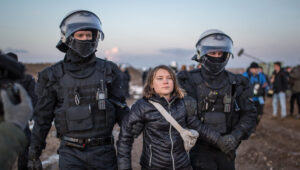To understand how the far-Right Alternative für Deutschland (AfD) became Germany’s second-largest party, consider the events of the past five days. In an interview with the state broadcaster ZDF on Sunday, Friedrich Merz, the leader of Angela Merkel’s Christian Democratic Union (CDU), made the mistake of suggesting that he would be willing to work in a coalition with the far-Right party. Less than 24 hours later, after facing a barrage of outrage, he was forced into a humiliating U-turn. This is how Germany’s political class hopes to deal with the rise of the AfD: their political resonance is recognised, but any breaking of the cordon sanitaire around them is regarded as dangerous legitimisation.
Much as the mainstream parties have failed to stop it, liberal commentators have also struggled to comprehend the phenomenon. They blame the party’s rise on extraneous factors, from an insufficiently democratic culture in the east (where the AfD enjoys extensive support) to Russian disinformation. A new taboo seems to have been erected around even discussions of the AfD’s popularity, whereby attempting to understand their rise is seen as some kind of endorsement. But the reality is that the party has benefitted from saying out loud the ugly things that others won’t. It would be simpler if the AfD could be shrugged off as another evanescent populist movement. But while gaining from a generalised political dissatisfaction, in their language and rhetoric, they give voice to some fundamental objections to Germany’s political culture — some of which date back to the refounding of the modern nation in 1989.
There are more extremist elements in the party’s ranks which date even further back in Germany’s history. The party was bitterly divided during the pandemic over whether to expel Andreas Kalbitz, an influential former candidate for premier of Brandenburg, when it surfaced that he had been a member of a banned neo-Nazi organisation, German Youths Loyal to the Fatherland. Kalbitz held considerable sway over the party’s more extremist eastern division, whose members were staunchly opposed to his removal. But the AfD’s middle-class libertarian wing in the West insisted on kicking him out; in the end, this more moderate wing had the final say.
Yet today, the party still retains some odious figures. In June, prosecutors in Halle brought charges against Björn Höcke, the incendiary leader of the party’s Thuringia chapter and of its extremist Der Flügel faction, for using the Nazi stormtrooper line “Alles für Deutschland” at a public event in Saxony-Anhalt. And the extremist Right-wing elements within the AfD have increasingly been viewed as a security risk. In 2021, the AfD became the first post-war opposition party to be placed under surveillance by the domestic intelligence agency over fears of extremism.
Despite its Rightwards shift in recent years, the party has only grown more popular. And rather than attributing this to a tradition of neo-Nazi extremism, the reason for the AfD’s proximate rise is more straightforward — and for Germany’s ruling parties, self-inflicted. Above all, the AfD has successfully capitalised on widespread disenchantment with the ruling coalition.
This dissatisfaction is rich and various: there is ample discontent with the coalition’s immigration policies, energy and climate approach, economic policy and foreign policy, especially with respect to the war in Ukraine. Indeed, it seems there is very little that voters are not dissatisfied with, and the little support that the coalition still enjoys stems from simply not being the AfD. After the relative calm of the Merkel years, the back-to-back cataclysms of the pandemic and war in Ukraine have proven crippling for Germany’s political mainstream.
For many, then, the AfD is a simple protest party: two-thirds of AfD voters say their support derives from disappointment with conventional parties, and only a third say they vote for the AfD out of conviction for its programme. And this is in keeping with the party’s historic strategy. Since their foundation 10 years ago, the AfD has shaped itself into an adaptable and protean vehicle for oppositional politics. Prior to the 2015 refugee crisis, this primarily came in the form of economic frustration. Founded as a free-market Eurosceptic party at the pinnacle of the euro crisis in 2013, the AfD initially opposed bailouts for southern European states and criticised Germany’s role in the euro, bemoaning her lost economic sovereignty.
But the refugee crisis would forever change its course. In that year, Germany took in nearly one million migrants, and the AfD seized on the attendant controversy by embracing a virulent new anti-migrant politics. The shift paid off enormously in the following elections. In 2017, the party secured representation in 14 of the 16 state parliaments and won 94 seats at the federal level to become the third-largest party in Germany. Today, the party’s stance on immigration still provides its bedrock of support.
The AfD’s message has resonated especially well in eastern Germany, where many of the exalted promises of reunification never materialised. Its affluent west has long struggled to fully acknowledge that the unparalleled moment of liberal triumph had serious downsides in its east. Between 1989 and 1991, more than 2.5 million people lost their jobs, while the number of workers in the manufacturing sector fell from 3.3 million to 1.7 million. Over 90% of East German factories and firms were bought up by West German companies. Seizing on this phenomenon of democratic disappointment, recent AfD campaigns have invoked and repurposed the rhetoric of 1989 (the Wende or “turnabout” of reunification), with calls to “complete” the unfinished revolution. For the AfD, the “establishment”, embodied in the conventional parties, constitutes another undemocratic imposition that must be removed as the DDR leadership once was. For instance, the AfD borrowed heavily from the so-called “peaceful revolution” around the fall of the Berlin Wall for its 2019 campaign in the eastern state of Thuringia. Their campaign materials were headed “1989-2019: Be There When History Is Made” and posters spoke of a “Wende 2.0”. The local leader, Björn Höcke, made the appropriation more explicit: “We’re completing the revolution!” he shouted at one rally.
He was drawing on an widely unacknowledged thrum of despondency in Germany’s political firmament. For the country’s victorious liberals, 1989 and the next year’s unification were a moment of unparalleled triumph. “This is a day of undiminished rejoicing,” Nato Secretary-General and former Defence Minister of West Germany Manfred Worner said in 1990. With such a self-congratulatory historical record, few wish to discuss the limitations and broken promises of transition. Instead of acknowledging that the “peaceful revolution” failed to deliver on its assurance of prosperity, they opt to blame the AfD’s popularity on the east’s “anti-democratic culture” produced by the experience of the “two totalitarianisms”, and condemn them for their “misuse” of the memory of unification. They fundamentally see the AfD’s popularity in the former DDR as a symptom of East Germany’s political immaturity.
But it isn’t democracy — or the free market — that AfD supporters in the east are against, nor do they seek a return to the DDR. First, the AfD has always been a virulently anti-redistributionist party. This makes the AfD somewhat distinct from other far-Right populist parties in Europe: it has never adopted pro-welfare policies or rhetoric in an effort to court voters from lower socioeconomic strata. Even less affluent AfD supporters report a preference for lower redistribution than the most affluent non-AfD supporters. Meanwhile, whatever their political conditioning, East Germans are also overwhelmingly supportive of democracy. A recent survey by EFBI revealed that 91% of East Germans identify with democracy as an idea, though less than half find satisfaction with the everyday practice and experience of democracy. And even as AfD moves further Right, it is increasingly seen as a “normal democratic party”. According to a survey by the Allensbach Institute for Public Opinion Research, 17% of Germans described the party in those terms in 2016; today, that number has risen to 27%.
The subtlety that has been missed is that the language of democracy, along with the rest of the rhetoric of 1989, has proven ideologically malleable — as easily deployed in service of the far-Right as in service of socially liberal politics. A lurid example came with the recycling of the slogan “we are the people”, originally borne on the revolutionary streets of Leipzig in 1989. In 2016, a mob of demonstrators, some of them supporters of AfD, shouted the slogan to protest the arrival of a bus carrying migrants in Clausnitz.
Yet however odious the twin rise of the German far-Right and the country’s wartime remilitarisation might sound, it is also significant that the militaristic impulse is not being driven by the AfD. Instead, it is the once-pacifist Greens that are leading the hawkish charge on the war in Ukraine. Here, the AfD has positioned itself as the anti-war opposition, calling for peace negotiations and restraint on sending arms. And there is evidence that the AfD’s nose for popular outrage is still serving them well. The “traffic light” coalition’s Ukraine policies are increasingly unpopular with large swathes of the electorate. A recent YouGov poll revealed that 55% of Germans now favour peace negotiations to bring about an end to the war in Ukraine, while only 28% are opposed.
A secondary outcome of the Ukraine war has also helped to propel the AfD. As energy prices soared over the winter and German cities discussed turning off their streetlights, the AfD defined itself in opposition to the so-called “Green agenda”. A much-reviled government plan to phase out oil and gas-heating systems caused immense public backlash (a single heat pump costs between €11,000 and €25,000 per household). Even with a partial government subsidy of up to 40%, this is simply not affordable for many people in Germany. As a result, relatively poor AfD voters now regard the Green Party as the antagonist of working Germans; according to one poll support for the climate movement in Germany has halved from 68% to 34% in the last two years).
Added to this, of course, is a broader, more chastening realisation: Germany is no longer Europe’s economic powerhouse, no longer the continent’s workshop. Earlier this year, the country slipped into a technical recession, and the IMF now predicts the country’s economy will shrink by 0.3% this year, contradicting Olaf Scholz’s predictions. The heady days of unification, then, with the Deutschmark as an idol of West German affluence and a post-war pacifist tradition firmly intact, have given way to a much bleaker wartime reality. And as long as the AfD articulates this disenchantment the most powerfully, it will be the chief beneficiary of Germany’s fall from the heights of exception.
Disclaimer
Some of the posts we share are controversial and we do not necessarily agree with them in the whole extend. Sometimes we agree with the content or part of it but we do not agree with the narration or language. Nevertheless we find them somehow interesting, valuable and/or informative or we share them, because we strongly believe in freedom of speech, free press and journalism. We strongly encourage you to have a critical approach to all the content, do your own research and analysis to build your own opinion.
We would be glad to have your feedback.
Source: UnHerd Read the original article here: https://unherd.com/




